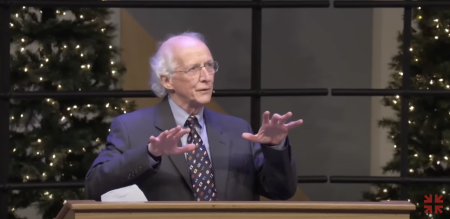Is God an ‘egomaniac’? John Piper responds

Notable Bible teacher and author John Piper tackled a claim that God is an “egomaniac” because He demands that people worship only Him.
In a message before the Engaging Truth Conference shared on the Desiring God website, Piper focused his remarks on Matthew 10:37-39, which reads: “Whoever loves father or mother more than me is not worthy of me, and whoever loves son or daughter more than me is not worthy of me. And whoever does not take his cross and follow me is not worthy of me. Whoever finds his life will lose it, and whoever loses his life for my sake will find it.”
Piper was responding to remarks previously made by Erik Reece, author of the book An American Gospel: On Family, History, and the Kingdom of God, who described his upbringing in a fundamentalist Baptist family that espoused an "oppressive kind of Christianity," that "emphasized our innate sinfulness, our unworthiness before God." As an adult, he abandoned such views. Reece is also a professor at the University of Kentucky.
Reece told National Public Radio in a 2009 interview that he considered the Matthew 10 passage as showing that Jesus was talking like an egomaniac.
“Well, it just struck me as, who is [this] person speaking 2,000 years ago, a complete historical stranger, saying that we should love Him, who we are really incapable emotionally of loving, more so than we love our own fathers and our own sons? And it just seemed like an incredibly egomaniacal kind of claim to make,” Reece said.
In response, Piper said, “God is the one being in the universe for whom self-exaltation is not the act of a needy ego, but an act of infinite giving,” adding that the “reason God seeks our praise is not because He won’t be fully God until He gets it, but because we won’t be fully happy until we give it.”
Piper quoted John 17:24, “Father, I want those you have given me to be with me where I am, and to see my glory, the glory you have given me because you loved me before the creation of the world.”
“That’s not egomania. It’s love,” said Piper regarding that passage. “Because nothing will make us happier forever than to be with the greatest Person in the universe, to see his glory, and to be changed to be like him.”
“The greatest news in the world is that in the death of Christ, God has made a way for his glory to be exalted and my sins to be forgiven in the very same act. God is ultimately glorified in us, and we are ultimately satisfied in him. And they happen together.”
Piper also believed that “God’s God-centeredness is the test of whether our own God-centeredness is real: Do I rejoice in God’s unwavering commitment to uphold and display his glory — do I rejoice in God’s God-centeredness?”
“Or am I God-centered only because deep down I believe God is man-centered, so that my supposed God-centeredness is really man-centeredness, even me-centeredness?” he continued.
“So, the crucial question is: Does my opposition to God’s God-centeredness reveal that my supposed God-centeredness is just a cover for wanting myself to be at the center?”
Piper has addressed the “egomaniac” question before, including in 2010 in a speech before approximately 21,000 college students at the Passion Conference.
“Wherever you hear God saying 'praise me,' what He's really saying is since praise is the completion of pleasure in greatness, please come to the fullness of your joy ... [and] of your satisfaction,” said Piper at Passion 2010.
“You weren't made to be somebody. You were made to know somebody and to be thrilled to know the greatest person in the world as your friend.”





















